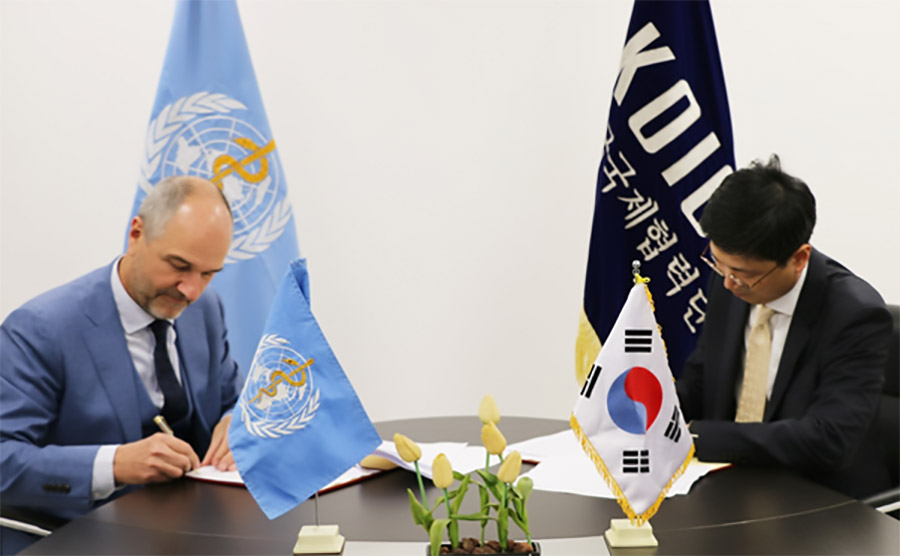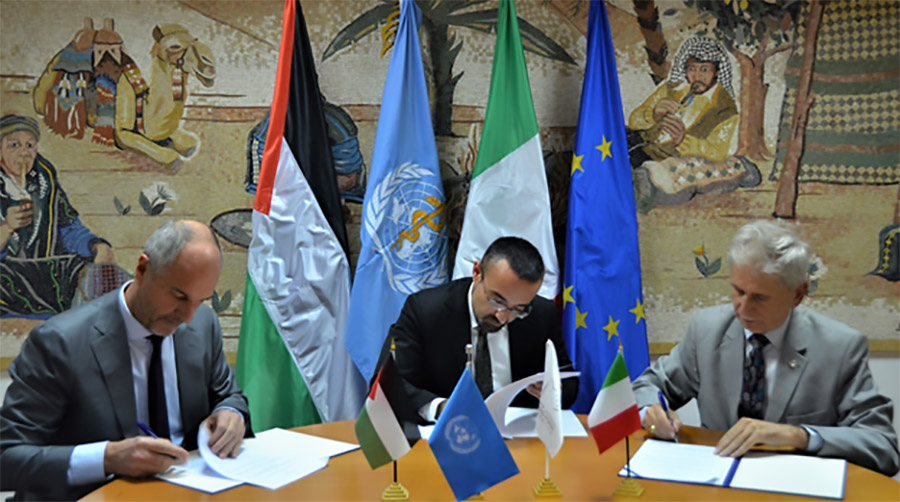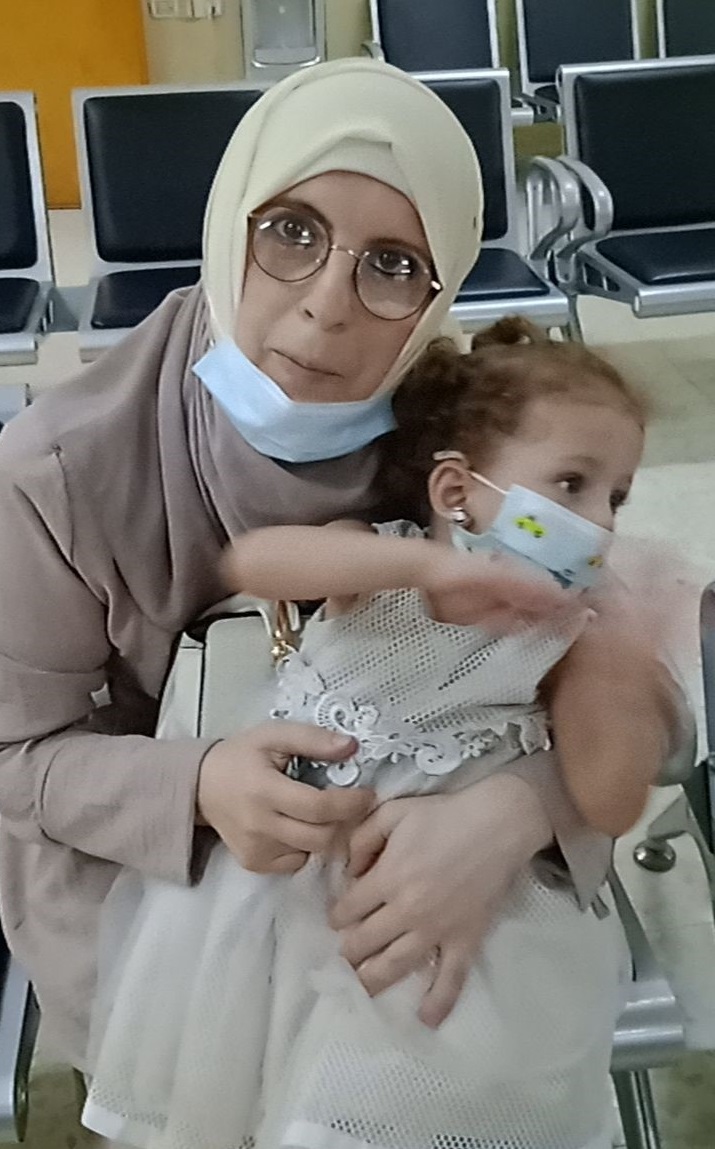World Health Organization and the Korea International Cooperation Agency sign off on establishing two Public Rehabilitation Outpatient Centres and Capacity building

Ramallah – West Bank, 09 December 2021 - Dr. Youseung Shin, the country Director of the Korea International Cooperation Agency (KOICA) in Palestine, and Dr. Richard Peeperkorn Representative of the World Health Organization (WHO) in the occupied Palestinian territory (oPt) signed off today on an agreement to establish two new Public Rehabilitation Outpatient Centers in Ramallah and Qabatiya in the West Bank, in coordination with the Palestinian Ministry of Health (MoH).
The first of its kind for the MoH in the middle and north of the West Bank, the 1.9 million Dollar project comes to support MoH in strengthening their health system by developing the two outpatient rehabilitation centres and ensuring Palestinian people will have improved access to evidence-based rehabilitation services. WHO will focus on building the capacity of 30 specialised MoH staff, who will be assigned to provide services at the centres and develop operational guidelines. In addition, WHO will be responsible for providing the two new centres (1,054 sqm total) with the adequate medical equipment and assistive products to help the centres’ MoH staff deliver comprehensive rehabilitation services that includes physiotherapy, speech therapy, occupational therapy, and mental health.
Thanking KOICA for supporting such an important project, Dr Richard Peeperkorn, the WHO Representative in oPt, said: “I would like to extend our sincere thanks to KOICA for funding this much needed rehabilitation project. The first of its kind for MoH, the project is expected to strengthen the rehabilitation services for Palestinian people in need. WHO in oPt is proud to be part of this partnership with KOICA and MOH.”
Expressing KOICA’s and the Korean Government continuo support to Palestine Dr. Youseung Shin the Country Director of KOICA in Palestine said: "We are happy to launch this new project in collaboration with the WHO oPt even under the current pandemic. It is designed to support vulnerable groups by strengthening public health services and relieving the government healthcare expenditure burden."
KOICA has supported the health sector since 2011 by establishing primary health care clinics in Jenin city with a budget of USD 3.2M and various follow-ups provided continuously to these clinics. Furthermore, KOICA supported the efforts of the Ministry of Health during the COVID-19 pandemic by delivering preventive and medical consumables.
KOICA has supported Palestine since 1994 and has provided USD 84,420,000 of assistance till the end of 2020. KOICA’s programs focus on providing quality health services to all Palestinians, quality education for youth, creating decent job opportunities, and government capacity building for quality public services.
Reduce avoidable morbidity and mortality in oPT by strengthening the Palestinian emergency health care system
 H.E. Mr. Giuseppe Fedele Consul General of Italy in Jerusalem (middle), Mr. Guglielmo Giordano Head of the Italian Agency for Development Cooperation (right), Dr. Richard Peeperkorn Representative of the World Health Organization (WHO) in the occupied Palestinian territory (left)
H.E. Mr. Giuseppe Fedele Consul General of Italy in Jerusalem (middle), Mr. Guglielmo Giordano Head of the Italian Agency for Development Cooperation (right), Dr. Richard Peeperkorn Representative of the World Health Organization (WHO) in the occupied Palestinian territory (left)
East Jerusalem, 15 December 2021 - Consul General of Italy in Jerusalem H.E. Mr. Giuseppe Fedele, Mr. Guglielmo Giordano Head of the Italian Agency for Development Cooperation (AICS) and Dr. Richard Peeperkorn Representative of the World Health Organization (WHO) in the occupied Palestinian territory (oPt) signed today an agreement to launch the health project: Reduce avoidable morbidity and mortality in oPT by strengthening the emergency health care system.
With a total budget of 5 million EUR provided by the Italian Cooperation the project will contribute to the strengthening of the of the Palestinian health system in terms of reducing avoidable disease, death and disability, and support the social stability during any sudden onset disaster, emergencies and outbreaks across oPt.
The project will operate over a period of three years with interventions at the three levels of care including pre-hospital, hospital and tertiary care. WHO will work closely with the Ministry of Health, the Palestinian Red Crescent and a number of local NGOs throughout the lifetime of the project and expect to target 230,000 beneficiaries across oPt.
“The Palestinian health sector has shown incredible resilience in the face of the unprecedented challenges posed by the pandemic. Italy intends to continue doing its part as a lead-Donor in this sector, by promoting increasing access to modern, high-quality health services for all the Palestinian people“ said Consul General of Italy Giuseppe Fedele.
Thanking AICS for funding this project, Dr Richard Peeperkorn, the WHO Representative in oPt, said: “I would like to extend our sincere thanks to AICS for funding this essential emergency program. It will build on the first phase of WHO trauma and emergency program and institutionalize key aspects of its concepts and activities to strengthen the health sector resilience and capacity”.
Some of the results expected is to enhance the capacity of prehospital services care during time of emergencies, improve health care services of NCD patients during emergencies, upgrade the essential emergency and surgical care delivered at major hospitals and improve effectivity of medical equipment use.
For more information:
Kazem Abu Khalaf
+972 542168723
Albert Saleh
+970 597 804 676
Maisa, 37, denied access to treatment for lung cancer
 22 November 2021 – Maisa is 37 years old and from Deir Al Balah refugee camp in the Middle Area of the Gaza Strip. She was diagnosed with lung cancer in July 2021.
22 November 2021 – Maisa is 37 years old and from Deir Al Balah refugee camp in the Middle Area of the Gaza Strip. She was diagnosed with lung cancer in July 2021.
Since July, Maisa applied 3 times for a permit to reach An-Najah Hospital in the West Bank, to receive cancer treatments that are not available in the Gaza Strip. None of her applications has been approved, and she has still not been able to receive the treatment she needs.
As a mother of 7, Maisa described how she likes to teach her children and support them with their homework. She said, “I like to tell my children stories and I love to help them with drawing and decorating their notebooks.” She also likes to write: “When I feel stressed, I write about my troubles but I never share my writing with others. I feel a relief after writing and then I throw away what I wrote.” In recent months, however, Maisa has had less energy to do the things she loves.
Maisa’s health has been worsening. She said, “Now I struggle to climb the stairs to our apartment on the fourth floor. It makes me breathless and causes me pain in my chest, and I missed some appointments at the hospital because of the difficulty in getting in and out of the house. My daughters and my husband are having to take care of me. My daughters divide their time between studying, taking care of me, and looking after the house. I used to enjoy visiting my brothers in Gaza City, but recently we haven’t been able to visit. My family become afraid when I get tired going out.”
Maisa worries about how her children are affected by her illness. “The worst is when I suffer pain and my young children look at me. They want to help but they can’t and I see the sadness in their eyes. It adds to my pain.”
Mohammed, Maisa’s husband, commented “I want to help my wife and I’m trying to do my best in this dire situation, but I feel helpless. I want her to get the treatment she needs as soon as possible. I would sell our car to cover the expenses if needed, but the treatment just isn’t available in Gaza. We would travel to Egypt if we can’t reach the West Bank, but there are so many delays. Maisa has waited too long, she needs this treatment now.”
UN Agencies and the Association of International Development Agencies stand by civil society organisations in the Occupied Palestinian Territory
14 November 2021 - The decision on 7 November of the Military Commander in the West Bank to declare by Military Orders the six Palestinian NGOs as unauthorized in the West Bank deepens the concern of the UN Agencies and the Association International Development Agencies (AIDA), working in the Occupied Palestinian Territory (OPT). The decision is a further erosion of civic and humanitarian space and stands to significantly constrain the work of the six organisations which have worked with the international community, including the UN, for decades, providing essential services to countless Palestinians.
“These allegations are taken very seriously. To date, none of the UN agencies nor AIDA organisations have received written documentation which could serve as a basis for the allegations”, said United Nations Resident and Humanitarian Coordinator for the OPT, Lynn Hastings. She added that “we will continue to engage with all relevant partners for more information”.
Counter-terrorism legislation must be in accordance with obligations under international humanitarian law and international human rights law, which include full respect for the rights to freedom of association and expression. It cannot be applied to legitimate human rights and humanitarian work; the breadth of the Israeli 2016 Anti-Terrorism legislation and its impact on the presumption of innocence present serious concerns under international law.
With our strong commitment to the indispensable role of civil society in democratic life and in finding peaceful solutions to conflict, many of us work with and some financially support these organizations. Past allegations of misuse of our funds by Palestinian civil society organization partners have not been substantiated. We will continue to stand by international law and civil society organizations that promote international humanitarian law, human rights and democratic values.
Contacts:
AIDA: Joseph Kelly, (972) 54-6703864,
UNSCO: Murad Bakri, (972) 54-5627815,








